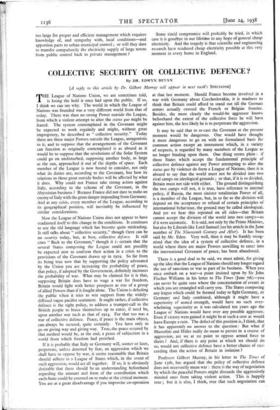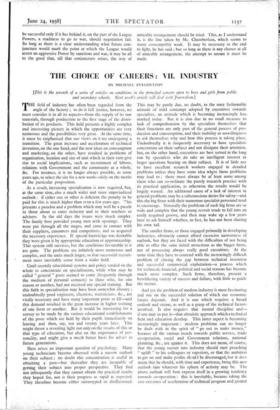COLLECTIVE SECURITY OR COLLECTIVE DEFENCE ?
By DR. EDWYN BEVAN
[A reply to this article by Dr. Gilbert Murray will appear in next week's SPECTATOR] THE League of Nations Union, we are sometimes told, is losing the hold it once had upon the public. If so, I think we can see why. The world in which the League of Nations was founded was a very different world from that of today. There was then no strong Power outside the League, from which a violent attempt to alter the status quo might be feared. The system contemplated in the Covenant might be expected to work regularly and might, without great impropriety, be described as " collective security." Today there are three major Powers outside the League, antagonistic to it, and to suppose that the arrangements of the Covenant can function as originally contemplated is as absurd as it would be to suppose that the revolutions of the Solar System could go on undisturbed, supposing another body, as large as the sun, approached it out of the depths of space. Each member of the League is now bound to consider, not only what its duties are, according to the Covenant, but how its relations to those great outside bodies will be affected by what it does. Why could not France take strong action against Italy, according to the scheme of the Covenant, in the Abyssinian business ? Because France did not dare to make an enemy of Italy with the great danger impending from Germany. And at any crisis, every member of the League, according to its geographical position, will inevitably be influenced by similar considerations.
Now the League of Nations Union does not appear to have readjusted itself to this change in the conditions. It continues to use the old language which has become quite misleading. It still talks about " collective security," though there can be no security today, but, at best, collective defence. It still cries " Back to the Covenant," though it is certain that the several States composing the League could not possibly be expected now to conform their action in a crisis to the provisions of the Covenant drawn up in 1919. So far from its being true now that by supporting the policy advocated by the Union you are increasing the probability of peace, that policy, if adopted by the Government, definitely increases the probability of war. What may be claimed for it is that, supposing Britain does have to wage a war for freedom, Britain would fight with better prospects as one of a group of allied Powers than if it fought alone. The Union is deluding the public when it tries to win support from the widely- diffused vague pacifist sentiment. It ought rather, if collective defence is the right policy, to address a trumpet-call to the British people to brace themselves up to enter, if need be, upon another war such as that of 1914. For that too was a war of collective defence. Peace, if peace is the main object, can always be secured, quite certainly. You have only to go on giving way and giving way. True, the peace secured by that method would be, at the end, a peace of subjection in a world from which freedom had perished.
If it is probable that Italy or Germany will, sooner or later, perpetrate, unless deterred by fear, an aggression which we shall have to oppose by war, it seems reasonable that Britain should adhere to a League of States which, in the event of such aggression, would act all together. If so, it is obviously desirable that there should be an understanding beforehand regarding the amount and form of the contribution which each. State could be counted on to make at the critical moment. You are at a great disadvantage if you improvise co-operation at that last moment. Should France become involved in a war with Germany about Czechoslovakia, it is madness to think that Britain could afford to stand out till the German armies actually crossed the French or Belgian frontier. Besides, the more clearly the would-be aggressor knows beforehand the extent of the collective force he will have against him, the less likely he is to perpetrate the aggression.
It may be said that to re-cast the Covenant at the present moment would be dangerous. One would have thought it more dangerous to go on with no formulated basis for common action except an instrument which, in a variety of respects, is regarded by many members of the League as no longer binding upon them. One thing seems plain : if those States which accept the fundamental principle of collective defence against any Power attempting to alter the status quo by violence do form a League of Nations, then it is absurd to say that the world must not be divided into two rival camps on ideological grounds ; or that, if it is so divided, Britain must not side with either. The ground distinguishing the two camps will not, it is true, have reference to internal policy, if Russia, the most sinister totalitarian Power of all, is a member of the League, but, in so far as the division will depend on the acceptance or refusal of certain principles of international behaviour, the ground may be called ideological. And yet we hear this repeated on all sides—that Britain cannot accept the division of the world into two camps—as if it were axiomatic. It is said, not only by the Prime Minister, but also by Liberals like Lord Samuel (see his article in the June number of The Nineteenth Century and After). It has been said by Mr. Eden. Very well, then it may be frankly recog- nised that the idea of a system of collective defence, in a world where there are major Powers unwilling to enter into the international Covenant of peace, has been abandoned.
There is a good deal to be said, we must admit, for giving up the idea that the League of Nations should any longer regard the use of sanctions or war as part of its business. When you once embark on a war—a point insisted upon by Sir John Fischer Williams in his letter to The Times (June 7th)—you can never be quite sure where the concatenation of events in which you are entangled will carry you. The States composing any league which could be formed today to fight Germany, or Germany and Italy combined, although it might have a superiority of armed strength, would have no such over- whelming superiority as it was calculated ten years ago the League of Nations would have over any possible aggressor. Even if victory were gained it might be at such a cost as would leave Europe a ruin. The defect of this position is, I think, that it has apparently no answer to the question : But what if Mussolini and Hitler really do mean to persist in a course of aggression, are we at no point to oppose armed force to theirs ? And, if there is any point at which we should do so, would not collective defence have a better chance of suc- ceeding than the action of Britain in isolation ?
Professor Gilbert Murray, in his letter to The Times of June isth, has argued that the policy of collective defence does not necessarily mean war : there is the way of negotiation by which the peaceful Powers might dissuade the aggressively minded ones from taking violent action. This is happily true ; but it is also, I think, true that such negotiation can be successful only if it has behind it, on the part of the League Powers, a readiness to go to war, should negotiation fail. So long as there is a clear understanding what future. con- juncture would mark the point at which the League would arrest an aggressive Power by sanctions and war, it may be all to the good that, till that conjuncture arises, the way of amicable arrangement should be tried. This, as I understand it, is the line taken by Mt. Chamberlain, which seems to many contemptibly weak. It may be necessary in the end to fight, he has said ; but so long as there is any chance at all of amicable arrangement, the attempt to secure it must be made.















































 Previous page
Previous page